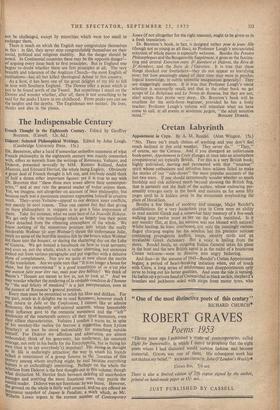The Indispensable Century
French Thought in the Eighteenth Century. Edited by Geoffrey Brereton. • (Cassell. 12s. 6d.) Diderot: Selected Philosophical Writings. Edited by John Lough. (Cambridge University Press. 15s.) DR. BRERETON, after a lucid if somewhat orthodox statement of what French philosophy in the eighteenth century was mainly concerned with, offers us morsels from the writings of Rousseau, Voltaire, and Diderot, presented severally by MM. Romain Rolland, Andre Maurois, and Edouard Herriot, the whole being English. Obviously a great deal of French thought is left out, and anybody could think of half a dozen other important figures: yet it is true to say with Dr. Brereton that "these three men tower above their contempor- aries," and at any rate the general reader of today enjoys them. Yet, we itnagine, not altogether on account of their philosophy, but because each was a passionate creature expressing himself in creative work. They—even Voltaire—appeal to our deepest inner conflicts, not merely to cool reason. Thus one cannot but feel that giving us these philosophers in snippets is to give a false impression of them. Take for instance, what we taste here of La Nouvelle Heloyse. We get only the trite moralisings which so largely lose their point when detached from the vibrating atmosphere of the whole. We know nothing of the monstrous position into which the really intolerable Wolmar (le sage Wolmar!) thrust the unfortunate Julie, catch no sense of the horrible tension felt by the lovers when Wolmar led them into the bosquet, or during the shattering day on the Lake of Geneva. We get instead a handbook on how to treat servants; and even so, not the whole, which is rather charming, but sentences Picked out from various-paragraphs and put together with a delusive show of completeness. Nor are we quite at ease about the merits of the translation. Are we quite sure that "It is no longer a house for show, but for convenience" is a good translation of ce n'est plus tine maison faite pour etre vue, mais pour etre habitee? We think of Bacon's "Houses are meant to live in, not to look at." And we May wonder whether the rendering of la veritable condition de l'homme by "the real felicity of mankind" is a just interpretation, even in the context of Rousseau's general position. Every man must be permitted to relish his likes and dislikes. For roY part, much as it delights me to read Rousseau, however much I may return to Julie or the Confessions, I cannot like or admire Rousseau, this indecently self-centred neurotic, whose lamentably great influence gave to the romantic movement and the "left" tendencies of the nineteenth century all their most immature, even their silliest characteristics. Voltaire I confess I warm to, in spite of his monkey-like malice (to borrow a suggestion from Lytton Strachey): at least he stood indomitably' for .something outside himself. For Diderot my affection and admiration are almost unbounded; think of his generosity, his tenderness, his constant courage, not only in his battle for the Encyclopedia, but in facing his Own (that is to say everybody's) impulses! His daring in thought i as in life is enduringly attractive; the way in which his friends talked is reminiscent of a group famous in the 'twenties of this century among whom anything might be said because everything human is so enthrallingly interesting. Perhaps on the whole the selection from Diderot is the best thought-out in this volume; though Mat distinction M. Herriot finds between deleting all unorthodox Passages and omitting the more licentious ones, may puzzle the candid reader. Diderot was not licentious: he was brave, However, the ground on the whole is fairly well covered, and we are offered an nocuous snapshot of Jaques le Fataliste, a work which, as Mr. Wilhelm Lunen argues in the current number of Contemporary Issues (if not altogether for the right reasons), ought to be given us in a fresh translation.
Dr. Brereton's book, in fact, is designed rather pour la jeune .fille (though not so young as all that), so Professor Lough's untranslated selection of whole pieces is especially welcome. Besides the Pensies Philosophiques and the Bougainville Supplement, it gives us the fascina- ting and central Entretien entre D'Alembert et Diderot, the Rive de D'Alembert, and the Suite de l'Entretien. It is true that these things shocked our forefathers--they do not appear so horrifying now; but how amazingly ahead of their time they were in psycho- logical knowledge, in subtle scientific imagination generally! They are staggeringly modern. It is true that Professor Lough's uncut selection is necessarily small, and that in the other book we get scraps of La ReligThuse and Le Neveu de Rameau, but they are not, alas! scraps that probe very deep. Dr. Brereton's book will be excellent for the sixth-form beginner, provided he has a lively teacher; Professor Lough's volume will stimulate what we have come to call, at all events in academic jargon, "the adult sensitive


































 Previous page
Previous page